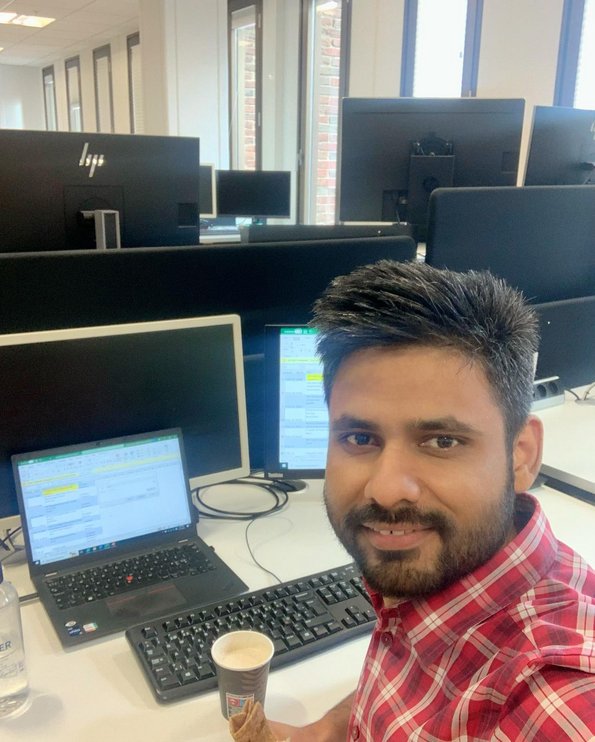Best of both worlds: Can a student job and studying be managed side-by-side?
Four Indian students answer the most frequently asked questions about working part-time while studying at Aarhus University.

When you come to Denmark to study, you gain so much more than just academic knowledge.
For starters, with a residence and work permit that allows 90 hours of paid part-time work per month, many non-EU/EEA international students have been able to find a sense of financial independence, rewarding work experience and an exposure to the unique Danish flat hierarchy and organisational culture. At least this was the experience of the four Indian students we spoke to for this blog.
A mix of current students and alumni answered all the pertinent questions that come up when someone is searching for a student job in Aarhus.
Meet the two Indian alumni and two current students:




Q1. Can you tell us a little about the student jobs you have had/have currently?
Janardhan Kammath (JK): Throughout my studies, I did various student jobs. I worked as a dishwasher, as a student assistant at the university’s International Centre and then as a student developer at Roku, which is a software company.
Chahat Gupta (CG): During my time as a student, I worked as a Student Data Engineer at Grundfos Headquarters in Bjerringbro for around 9 months.
Abhishek Sairaj (AS): I am a member of the cleaning team (service team as we call it) at Studenterhus Aarhus.
Sumeet Karra (SK): Currently, I am working as a Student Assistant at Siemens Gamesa Renewable Energy. The organisation is at the forefront of offshore turbine installation not only in Europe, but across the globe.
Q2. How did you find your student job(s)?
JK: I found a dishwashing job on this Facebook group called "Jobs I Aarhus." There is a lot of information there for part-time student jobs. For the job at the International Centre, I checked Aarhus University’s vacancy portal. I found the job at Roku on LinkedIn.
CG: Before landing this role, I applied for over 50 jobs, but nearly every time, I either received rejections or was ghosted after the first interview. A few times, the feedback was that I wasn’t the right fit for the team. Luckily, a friend who had worked in the same team referred me to this position, which ended up being a great opportunity.
AS: I was already a volunteer at the Studenterhus and was thereby well-known in the house, so when I saw the posting, I just spoke to my boss with whom I had a small interview and then was selected for the job.
SK: After receiving the offer letter from AU, I started very proactively looking for a student job. Before my first semester started, I had already gotten my student job.
Q3. Has the student job been helpful in covering expenses?
JK: The best thing about Denmark is that no matter what job you get as a student, it is decently paid. The minimum wage is good. With 20 hours a week, it is possible to earn enough to cover all living expenses. In summer (June, July, August), students can work full-time for 37 hours. Doing this helped me save a lot of money, which helped me during the following semester I spent in Italy on an exchange program.
CG: In terms of pay, the student job offered a competitive salary, on par with what other MSc Computer Science students typically earn. After covering rent, food, and transportation, I was able to save around 1500 DKK each month as an emergency fund, which was a nice bonus.
AS: Since my shifts are not so much, I don’t make enough to cover my entire expenses myself. I usually get financial support from my parents for my rent and can take care of my other day to day expenses here.
Q4. With a student job, is it possible to balance working and studying with ease?
JK: In most student jobs, the employer is okay with the student taking a break for an assignment or submission. I would often take off from work during my exams. Everyone is respectful of that.
CG: The job required around 15 hours of work per week, and I started at the end of my third semester. I was deep into researching thesis topics and looking for a supervisor, so this part-time role fit nicely into my schedule. I only needed to be physically present at the Grundfos office two days a week, which gave me enough flexibility to plan the rest of my week around my studies and personal life. In fact, I even managed to do my thesis with Grundfos, which made balancing work, school, and my social life much easier.
AS: Fortunately, my job is mostly only on the weekends, so it does not affect my studies. We also get to choose our own shifts for work and therefore we can choose to work according to our own schedules. I usually meet my friends on the weekdays and since most weeks I have to only work on Saturdays, I have Sundays free for any social activities or to just take a day off!
SK: It feels great that this student job is perfectly aligned to my studies. My tasks are centred around lean construction, which is one of the core subjects of my study line and also my most-liked subject. Therefore, at work I can very well relate to the practical implications of the knowledge that I am getting in my lectures. Moreover, I am planning to write my master’s thesis on something related to lean construction, too.
Q5. What is one thing you want to tell students searching for a student job in Aarhus?
JK: Make a tax card for yourself before you start working! When I first started working, I didn’t have a tax card. There is a significant difference in how much you can earn with and without the tax card.
CG: In Denmark, if you work as a student for more than a year, there’s a good chance the company will offer you a full-time position afterward. That trust and long-term investment in student workers really stood out to me.
AS: Number one advice: Networking! The Studenterhus is a great place for networking as you can meet so many people, Danish and international at the house who can provide you with important contacts for getting a job. Also knowing some Danish beforehand will be of great help. Finally, it's truly a waiting game. You have to look out for openings and should be really patient, as Aarhus is a college city and there are a lot of university students looking out for jobs here!
SK: A well drafted CV in an appropriate format along with a motivation letter are a must for jobseekers in the Danish job market. Also, having an updated profile on LinkedIn, highlighting one's professional skills and work experience is very important. However, keeping an eye on companies’ websites is vital as not all positions are advertised on LinkedIn.
To sum up
Non-EU/EEA students can work part-time (90 hours/month) during their studies and full-time (37 hours/week) during the summer (June, July and August).
The minimum wage in Denmark starts from 110 DKK/hour. You can check out what an average monthly student budget looks like here.
To find jobs, check Facebook groups (Jobs I Aarhus, Internationals in Aarhus, etc.), the university vacancies portal or LinkedIn.
Most student jobs are flexible, with employers encouraging students to prioritise their studies.
Make a tax card before you start working. The process is simple and can be done through a phone call with SKAT (Danish tax authorities).
Editor’s Note
Aarhus University is committed to helping students excel in their academics and in the professional world. The university offers multiple career services for all international students.
Every semester, you can participate in a job fair or various networking events that take place on campus. There are also workshops or sessions on writing an effective cover letter or effective ways of using LinkedIn to find a job in Denmark.
To get in touch with the Career Service Centre at your faculty, click here.
